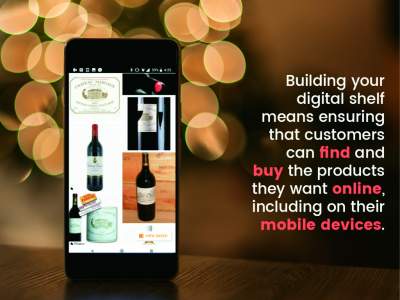IWSR research indicates that 1.8% of the value of all global beverage alcohol is now Sold through E-commerce
Like others, the drinks industry has recognized what a critical medium the digital environment is to interact with consumers, inform them, learn from them and ultimately to sell to them. Regulation has made the online retailing of alcohol more complicated than other sectors and this has stifled development, but this is changing.IWSR Drinks Market Analysis’ global database now captures just how effective drinks players have been at selling digitally. Although variances inevitably exist between markets, the results for 2018 show that 1.8% of the value of all alcoholic drinks traded around the globe is now sold through e-commerce.
It is wine that has best harnessed the selling power of the online retail environment. Last year as much as 3.6% of all wine value sales stemmed from e-commerce outlets, a figure that translates into nearly US$8bn of sales.
The rapid expansion of wine sales online has even threatened the viability of independent “bricks and mortar” wine stores in the UK. Online wine sales in the country have reached 6.5% of total sales value, prompting one leading wine retailer, Majestic, to announce that they are to sell off much of their retail estate to concentrate on their online business, Naked Wines.
The extensive number of wine producers and the diversity of choice has meant that a culture of experimentation has always existed within the wine sector. The online environment has proved to be well placed to service wine drinkers’ curiosity and to educate and inform consumption choices. The dramatic expansion of online wine marketplaces like Vivino, which after just nine years of trading now claims to have 10 million different wines and as many as 35 million users, has illustrated just how compatible wine selling is within the digital space.
 Sales of spirits through e-commerce may not be as pronounced as wine, but IWSR research shows that around US$6.5b of spirits were sold online in 2018, a figure that represents 2% of all global spirits’ value sales. For example, ecommerce is reported to now be Pernod Ricard’s fastest growing channel.
Sales of spirits through e-commerce may not be as pronounced as wine, but IWSR research shows that around US$6.5b of spirits were sold online in 2018, a figure that represents 2% of all global spirits’ value sales. For example, ecommerce is reported to now be Pernod Ricard’s fastest growing channel.
Direct selling on owned online platforms has proved less effective for spirits operators than partnerships or acquisitions with established online retailers and delivery services, perhaps because it compromised choice to exclusively sell their own brands. The recent trend has been for operators to partner with existing online platforms to maximise exposure and to showcase their brands from a different angle to consumers.
The development of the online marketplace is happening at different speeds with drinkers in some markets quicker to adopt new purchasing practices and habits than others. The reported 800m Chinese internet users have been quick to embrace the advent of e-commerce. The explosion in smart phone use, social media apps and mobile e-commerce has facilitated this shift in buying habits and meant that 6.5% of off-premise sales of all alcoholic drinks are now ordered online in China.
The e-commerce channel has proved particularly popular for wine sales in China. Encouraged by fierce competition, which has ensured low prices and fast delivery, online sales now account for 9% of sales value – that is a fifth of all off-premise wine sales, as well as online spirits sales of almost 4%.
Even in markets like China where e-commerce penetration is already comparatively high, it can be assumed that the e-commerce channel will continue to take share from “bricks and mortar” retail. The development of the channel will be fuelled by convenience, competitive pricing, a quickening speed of delivery and by rising digital competence.
The shift to digital platforms will change the alcoholic drinks landscape forever, providing a marketplace for a plethora of brands and concepts that are no longer reliant on winning shelf space from a few major retail chains.
The future alcoholic beverage market will be a more diverse and interesting place as a result.

